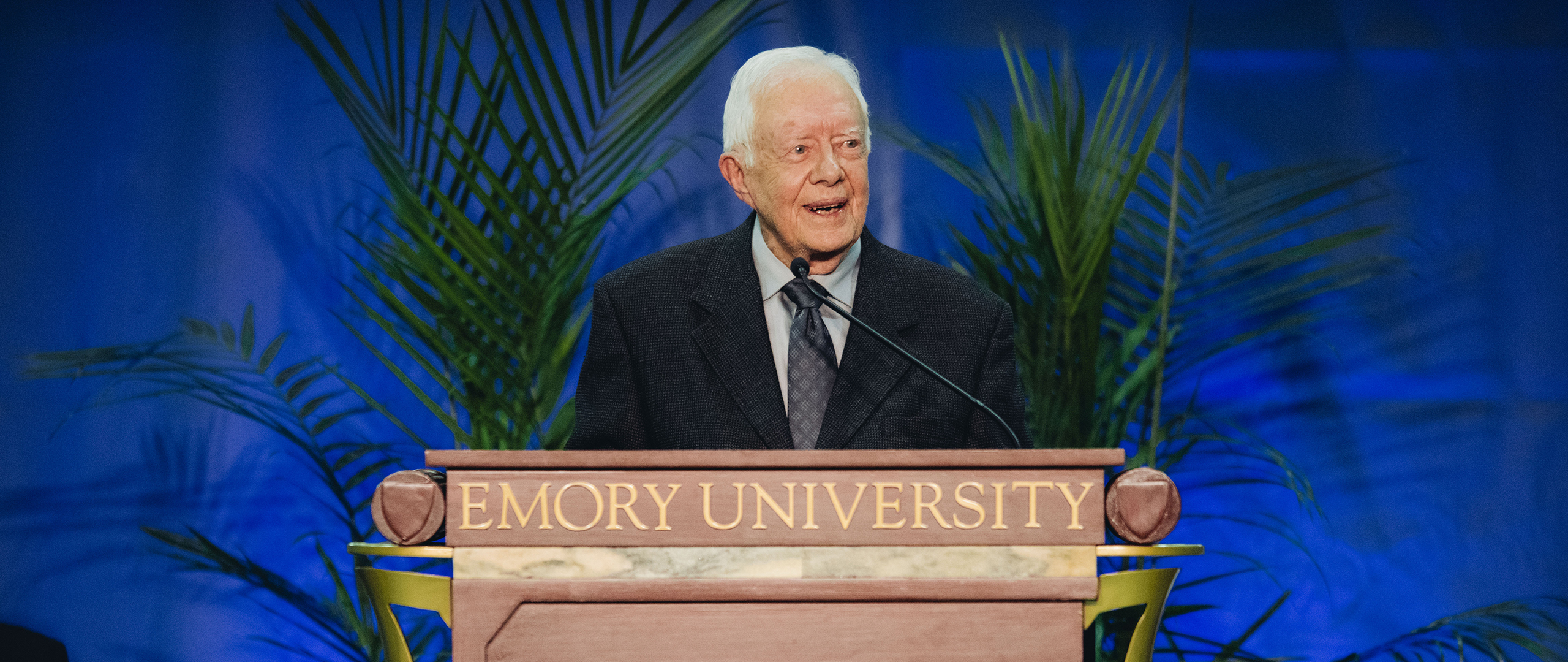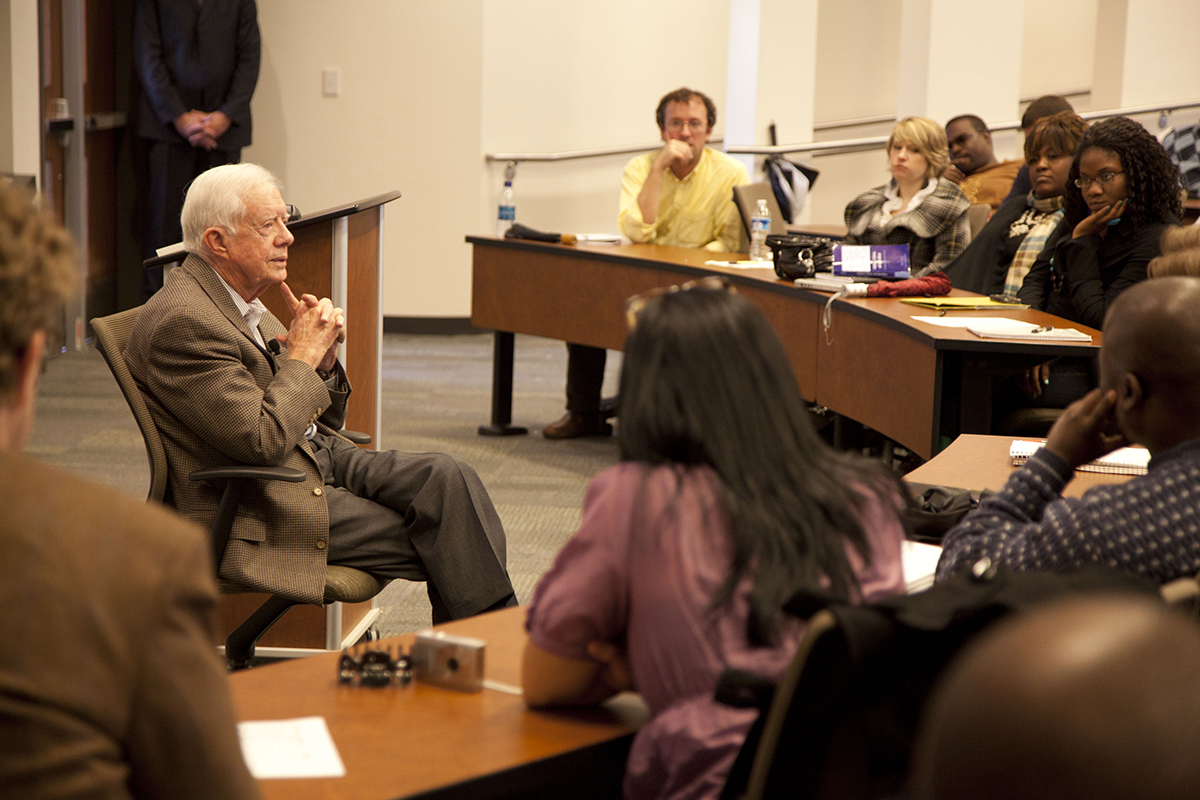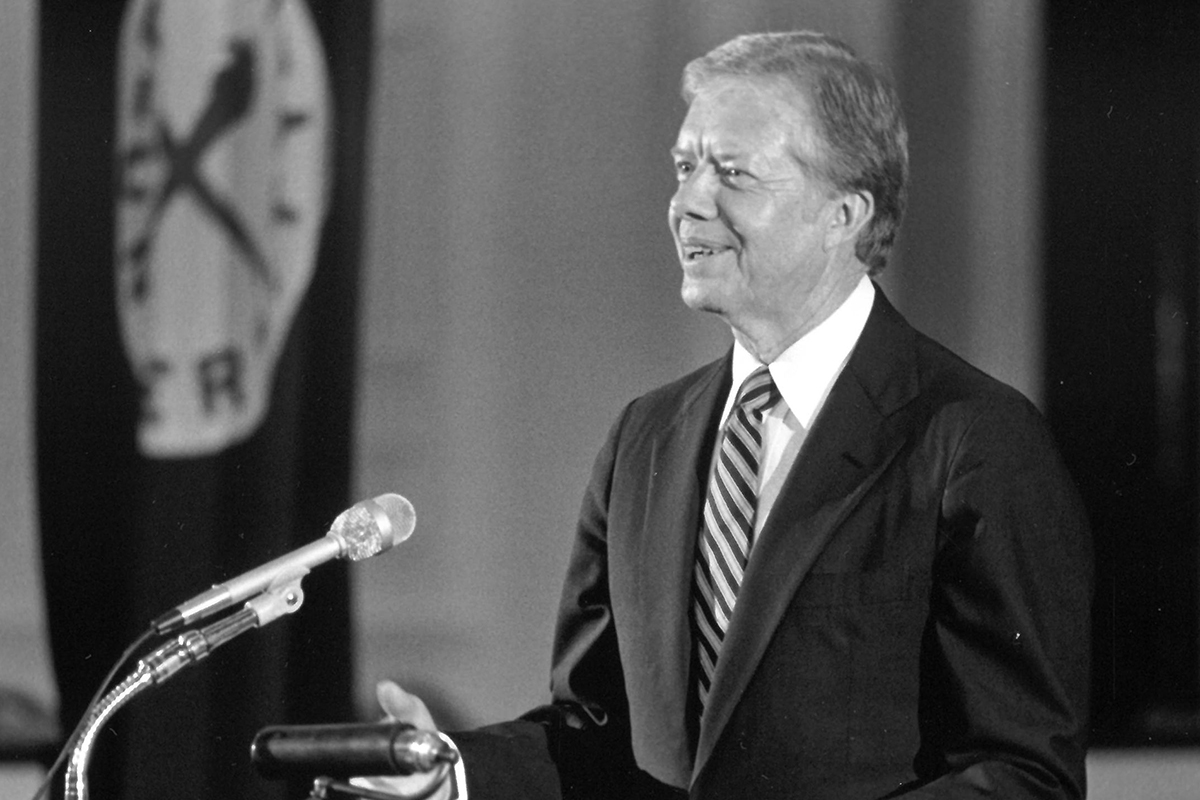
The Carter Center and Emory University
Four decades of collaboration in service to humanity
Sept. 16, 2022Emory University’s ties to The Carter Center go back to the center’s genesis and remain vital today. Forty years after its founding, the post-White House institution of former President Jimmy Carter and his wife, Rosalynn, operates peace and health programs around the world with Emory as a key partner.
After leaving office in 1981, the Carters retained the commitment to advancing peace and human rights that had been the hallmark of President Carter’s administration. Having fielded offers from several universities, they agreed in 1982 to a partnership with Emory, an institution whose values they felt mirrored their own.
After talking with then Emory President James T. Laney, the Carters became to believe that the center they intended to build could draw on the university’s unique resources and serve the world in a distinctive way.
“President and Mrs. Carter saw in Emory a collaborator whose principles and ethics reflected the values they believed in,” says Paige Alexander, CEO of The Carter Center. “The partnership remains vital to our global mission, with Emory graduates, researchers, thinkers and leaders helping us build a healthier, more peaceful world.”
The partnership is equally important to the university, enriching the lives of generations of students and faculty who have had the opportunity to learn from President Carter and to engage with The Carter Center.
“Emory’s decades-long partnership with The Carter Center is unlike any other in higher education, benefitting communities the world over,” says Emory President Gregory L. Fenves. “It continues to harness the immense talent of Emory scholars and alumni, applying their research and expertise to carry out President Carter’s profound vision for peace, health, and human rights across continents and borders.”
Thousands of Emory students have fond memories of his many visits to classes across a wide range of subjects, as well as the annual Carter Town Hall, a beloved campus tradition. For 38 consecutive years, President Carter was the sole keynote speaker at the town hall, offering his wit and wisdom in response to student questions. Now, the time-honored tradition gives first-year students an opportunity to engage in interactive dialogue with international thought leaders.

Throughout the decades, President Carter has lectured in Emory classes across a wide range of disciplines.
40 Years of Collaboration
As Emory and The Carter Center celebrate 40 years of collaboration, both continue to influence and impact each other.
Several Carter Center experts are Emory adjunct professors, bringing their expertise in international affairs, conflict resolution, public health and more into the classroom. Emory researchers collaborate with the health and peace programs both in the field and in the laboratory. For example, Sarah E. Morris, Emory Libraries head of instruction and engagement, recently helped The Carter Center create a series of media literacy videos to combat disinformation in media and online.
Numerous Carter Center staff members are Emory graduates, and Emory graduates and graduate students often serve as interns in every Carter Center program. Four Carter Center health program directors — Eve Byrd, mental health; Kelly Callahan, trachoma; Gregory Noland, river blindness, lymphatic filariasis, schistosomiasis and the Hispaniola Initiative; and Adam Weiss, Guinea worm — hold degrees from Emory.
The two institutions’ relationship has grown and evolved over the decades.
In September 1982, in an office on the 10th floor of the Robert W. Woodruff Library, The Carter Center of Emory University (as it was then called) came into being. President Carter dreamed of creating a kind of post-presidential Camp David, a place where the leaders of countries in conflict could come to negotiate peaceful resolutions to their disputes. Election observation, human rights advocacy, agricultural assistance and public health work soon followed.

President Carter speaking to Emory students at the first Carter Town Hall, held in 1982.
In the early years, a few key individuals connected the work of The Carter Center to academic life at Emory. Jointly appointed Carter Center fellows such as Robert A. Pastor in the Department of Political Science, William H. Foege in the Rollins School of Public Health, Frank S. Alexander in the School of Law and others established direct links between the center’s humanitarian work and scholarship at Emory.
Over the decades, coordinated efforts on the part of The Carter Center and Emory have resolved conflict, advanced democracy and human rights, improved African farm productivity, prevented disease and improved physical and mental health care. This collaboration has fostered a community of scholarship and practice that has had an impact far beyond the two institutions.
In 2001, President Carter and former Nell Hodgson Woodruff School of Nursing Dean Marla Salmon dedicated Emory’s Lillian Carter Center for Global Health and Social Responsibility (then called the Lillian Carter Center for International Nursing). Named for President Carter’s mother, “Miss Lillian,” the center serves as the focal point for the school’s international nursing and midwifery work and facilitates its many domestic service-learning programs that focus on vulnerable populations. The faculty and students have worked with The Carter Center on mental health and public health training in several African nations.
Today, the relationship between the university and The Carter Center remains strong.
President Carter remains a member of the faculty as a University Distinguished Professor. Though largely retired from public life now, for more than 35 years he was a steady presence at Emory — fielding questions from first-year students at his annual town hall, holding regular luncheons with small groups of faculty and staff, meeting monthly with the university president over breakfast, and appearing in classes and special forums during the fall and spring semesters.
“I’ve taught in all the schools at Emory,” President Carter says. “It has kept me aware of the younger generation, their thoughts and ideals.”
He remembers how President Laney convinced him and Mrs. Carter “that he had a moral and ethical vision for the university that we could share and help to advance.”
With a four-decade track record, the relationship between Emory and The Carter Center is something in which both can take pride.
